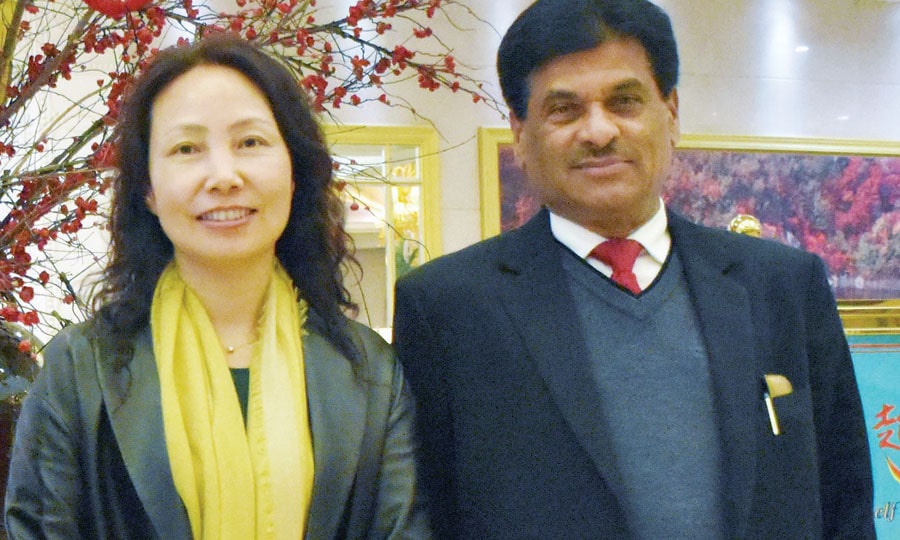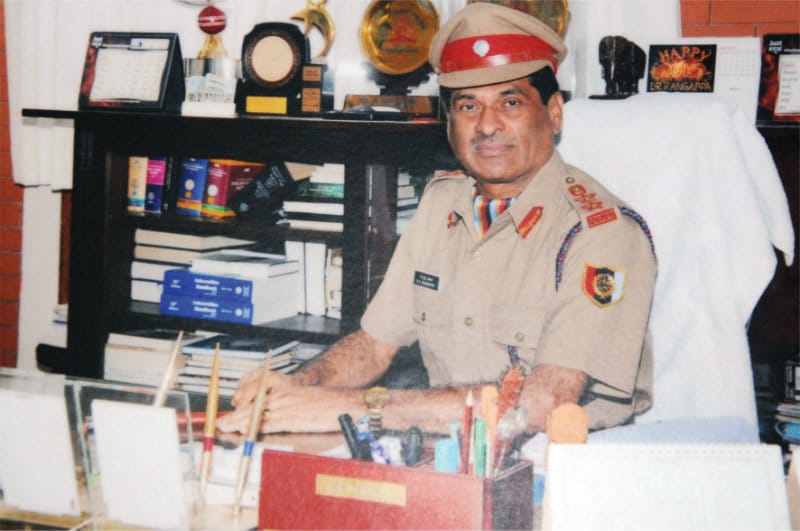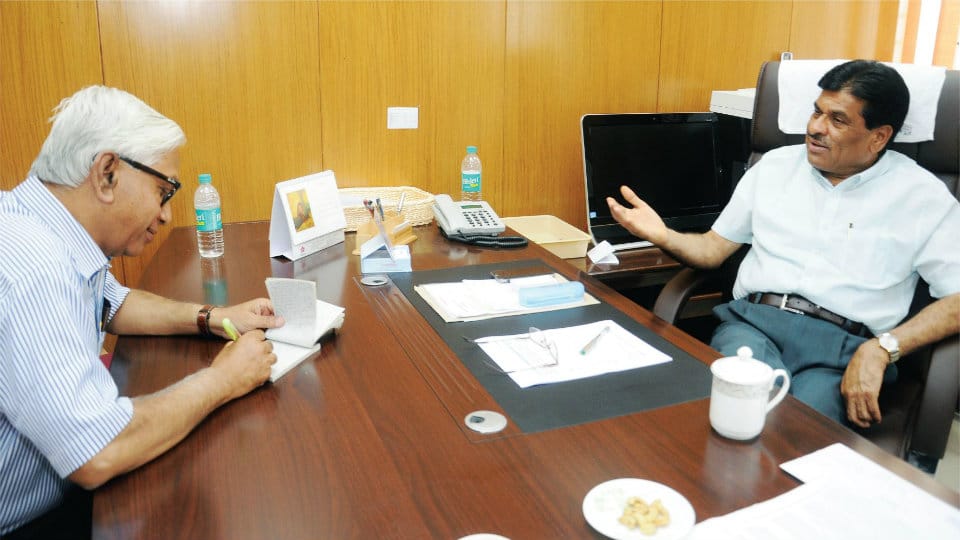If there is one person who made a difference to the University of Mysore in recent years after D. Vijaydevraj Urs (1976–1979), it is the immediate past Vice-Chancellor (VC) Prof. K.S. Rangappa. Even his staunchest opponents grudgingly acknowledge it. There was never a dull moment in his 4-year tenure at the Karnataka State Open University (KSOU) and another 4-year tenure at the University of Mysore (UoM) where he completed his term in January this year.
A man who has never refused to call a spade a spade, now, being free from the trappings of officialdom, Prof. Rangappa was waiting to explode.
In this no-holds-barred free-wheeling interview to Star of Mysore at his chambers in the Institution of Excellence, Vijnana Bhavan, Manasagangothri campus, the media-savvy former VC, a Distinguished Professor of Chemistry, shares his anguish about our politicians, bureaucrats, his own fraternity and the media. He also tells the reason why he chose to go with the Chinese and his experience as the Vice-Chancellor of two Universities and, of course, why he is contemplating entering politics. Excerpts. —Ed
By N. Niranjan Nikam, Senior Journalist
Star of Mysore (SOM): Sir, after a successful stint as Vice-Chancellor of two Universities, that too in Mysuru only, you have moved to a pharmaceutical company in China as Chief Scientific Advisor. How did this happen?
Prof. K.S. Rangappa: I have published more than 450 papers in national and international peer reviewed journals and I have got 10 patents and the whole world knows the kind of patents and the kind of papers I have produced. However, sadly India has not come to know of my accomplishments. Many important patents have been done in collaboration with Hokkaido University, Japan, National University of Singapore and University of Cambridge, United Kingdom.
What do I do with these 10 patents? If I don’t see any kind of progress in my work then what will be my contribution in spite of doing so much? The pharmaceutical industry in India, especially some of the multinational companies, are trying to bargain with me for cheap prices for my patents. They want it at the cost price for all the effort that has gone into getting the patents. But that is how the Indian mindset works. They do not recognise my merit and my young team’s effort. The involvement of bureaucrats and petty politicians in decision-making is really sad and none of these people want to understand my research at all.
Unfortunately, the media also does not understand or does not want to understand my work. Instead, they focus more on other petty issues and look at everything politically. Recently I had two meetings, one in Singapore and another in China, and this company from China showed interest in my patents. Hence, I went to Chinese.

Prof. K.S. Rangappa with Dr. Sophia, Chief of Sinotar Pharmaceutical (Shenzhen) Co. Ltd., during his recent visit to China.
SOM: Chinese, by nature, are very strict and they do not trust people very easily. How did you gain their confidence?
Prof. Rangappa: You are right, the Chinese are very strict and do not trust people very easily. But it is only because of my work and nothing else that they came to me.
First, a person from Singapore, Prof. Peter Lobie saw the lab results and also tested the drugs in their laboratory in Singapore and only then they came to me. The owner of Sinotar Pharmaceutical (Shenzhen) Co. Ltd., Dr. Sophia had come to Mysuru to see for herself the kind of work we are doing. Only when she was convinced, she has applied for a multiple permanent entry Chinese visa for me. The kind of work I am doing is cancer biology and drug discovery.
SOM: What is the highlight of your recent visit to China?
Prof. Rangappa: I had been to three places, one is to Shenzhen, one of the wealthiest cities of China, the second is the head office of Sinotar at Shanghai and the third is to the Huanghuai University in Henan Province. The President of the University had invited me to discuss and deliver a talk about my research and also to set up an R&D Centre.
This is my third visit to China. Earlier, I had gone in 2010 as an invited speaker for Chemical Biology Conference and in 2014 I had gone on an official visit to this University to sign an MoU.
SOM: What is the kind of progress that China has made in these years?
Prof. Rangappa: Let me put it this way. When I was in the US about 25 years ago, there were also Chinese at the University where I had gone to do my research.
No country in the world can beat China at present, because everybody there works with honesty, integrity and patriotism. Just like the Americans welcomed the intelligent people from all over the world earlier, the Chinese are doing it now. Otherwise, why would they have invited me.
I was simply bowled over looking at their furniture, each table, each sofa is so artistically designed and crafted. I feel, we cannot catch up with them at all. An Education Summit is being held in June of this year and I have been invited again to deliver a talk and they will give me a business class ticket and seven star accommodation. They are even ready to give me an apartment for three months. That is how the Chinese woo you, if they find you good. Does this happen in our country?
SOM: Being the VC of KSOU, you transformed the campus physically. But there is criticism against you that such huge buildings were not required. How do you justify it?
Prof. Rangappa: When I entered the KSOU, I was disappointed. I thought this is not the place for a man of my accomplishments. For having accepted, what do I do? I studied the KSOU Act in detail and took the suggestion and advise of the Solicitor General of India. The KSOU was a lazy workplace where all they were doing was dispatch lessons and study materials. But what is the aim of KSOU? It is ‘Education at Door-steps’ and it is the Government which has legislated this Act.
There were no statutes. I streamlined the statutes according to the Act. I decided that I am going to give education to everybody in every district in the State. As a result, 3.5 lakh students enrolled finding that KSOU imparts good education. The revenue went up to Rs. 650 crore. Once the student strength went up we needed classrooms, place for valuation and classrooms for contact programmes. We were paying Rs. 7.5 lakh to Rs. 10 lakh rent every month hiring places in different districts. Hence, I decided to improve the infrastructure with the fees we collected from the students. Is this wrong?
The Government talks about increasing the Gross Enrolment Ratio (GER) in education. Is this not a step in that direction?
There are more than 47 Open Universities in China alone and also Open Universities in Japan, South Africa and other countries. When I was the VC I had taken on the UGC and other bodies, challenging them to show why I should not open centres and courses according to the Act. No one then dared come and question me. In fact, we were second only to Indira Gandhi National Open University (IGNOU) in the country when it came to distance education. When I could do it, why did the VCs who have come subsequently not able to do it? Because they lack vision and commitment.
There was one Board of Management Member who kept targeting me because of his personal interest and agendas (even in my last tenure as the VC of Mysore University). But he could not touch me. Instead, he has cheated the Government and the public by his criminal act recently. Should he not be punished for all the misdeeds? Whereas, I had created a world-class infrastructure and brought about financial stability by following the Acts and statutes. Is it a sin?
SOM: Coming to University of Mysore, you did remarkable work as the Centenary Year Vice-Chancellor. You also had to overcome lots of hurdles. How do you feel looking back now?
Prof. Rangappa: I have seen many Universities in the world, studied and learnt from them and their workings. I was very keen to adopt their best practices. As the VC of the century-old University, I strongly believe that I gave hundred percent of my body, mind and soul to the University which has given me everything as a student, teacher and finally, its Vice-Chancellor. I have done so much to improve the infrastructure of the campus that for the next ten years nothing more needs to be done.
However, I am very pained to say that the faculty is not up to the mark at all. All they are interested in is petty politics and trying to become rich. Except for a few in the Science Departments, who are really doing good work because of which the University has still some recognition in the country, the rest have no commitment except being self-centred and selfish. This is because there is neither accountability nor punishment. I had plans of improving it to the level of University of Cambridge and the least I could do was, transform Manasagangothri physically into a world-class University.
SOM: The higher education system in the country is in a sorry state of affairs. You yourself were not allowed to fill hundreds of vacant posts of Assistant Professors and senior faculty. Please comment.
Prof. Rangappa: The Universities are in the grip of bureaucrats and Higher Education Ministers lacking in vision who do not have concern for higher education. There were many Indians from Yale, MIT and other top Universities in the world who called me excitedly and said that they were interested in coming back to serve the University of Mysore as they felt that a hundred-year-old University could offer them something nice where they could share their knowledge and experience. Because of the Higher Education Minister, the bureaucrats were also against it, I could not do any recruiting. But you must know that the Governor was for filling the posts. When there was so much opposition to my good intentions, I finally decided that why should I take the risk and jeopardise the interest of the aspirants. Hence, I gave up the idea of recruiting. I am also sorry to say that with many senior Professors retiring, the posts are lying vacant and the quality as a result is suffering.

Colonel Rangappa, I presume?: A file photo of Prof. K.S. Rangappa in uniform after he was honoured with a Lifetime recognition by NCC as Colonel Commandant in 2015.
SOM: Your last day in office was also the day you took over as the VC on January 11, 2013. Why is the Government so lackadaisical in not appointing the new VC on the day your term was over?
Prof. Rangappa: The Higher Education Department has no respect for the VCs. Earlier, they would appoint the VCs well in advance and the day the tenure of the incumbent VC ended, he or she would hand over charge to the new VC. But it is sad to say that the powers that be have least interest in the University.
SOM: Whether it is education or in other fields, mediocrity seems to rule. You yourself have worked abroad. Would you like to share your thoughts on this?
Prof. Rangappa: Definitely, I agree with your observation. In the US, for instance, top scientists and achievers’ opinions are sought in policy-making decisions. In our own State, for example, this does not happen.
SOM: There was a time when the first VC of University of Mysore was selected by the Maharaja Nalwadi Krishnaraja Wadiyar himself and a few others were hand-picked later. Is it right that the Government is interfering too much in the appointment for such eminent posts?
Prof. Rangappa: Certainly correct. Earlier, when a Cabinet Minister wanted to meet the VC, he had to seek an appointment with him. There were men of such stature occupying this post. Now, even when an MLA calls, the VCs meekly follow him; it is because of the quality of the VCs chosen.
SOM: The opposition to accord autonomy to Bahadur Institute of Management Sciences (BIMS) and cast aspersions on the donor speaks very poorly of the people sitting in judgment. When autonomy is the way forward and you had strongly supported it, why do you think there is a controversy on this despite the Syndicate decision?
Prof. Rangappa: You know why? If there is autonomy given to BIMS, then the people who are working there in the Department have to go back to their parent Department. What the donor Dr. Bahadur is talking about is not palatable to the Professors in the Department. They are only interested in the first class facilities provided to them and going out for valuation work to many places on the same day and sign the register at their Department and make money.
Let them run an MBA Department somewhere. Dr. Bahadur was interested in setting up an IIM-B type of autonomous institute. Why should they come in between? Since they cannot match or grasp the donor’s vision, they are opposing, which is very sad.
SOM: You have expressed your ambition to enter politics and contest the Assembly elections next year. Is this true and if so, why do you want to do it?
Prof. Rangappa: I must tell you that the moment there were whispers that I am interested in entering politics, many people whom I thought were close moved away! As an academician and Vice-Chancellor of two Universities, I have achieved something. But there are many things which I still want to do in education and the only way I can do it is by being a part of the policy-making body and this I feel I can do it if I become part of the Government .








Are you sure about new V.C.of Mysire university